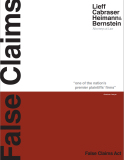Fraud on the Government
Significant Recoveries, Extensive Experience
Lieff Cabraser represents whistleblowers who uncover fraud on the government in a wide range of Qui Tam / False Claims Act cases, including medicare and healthcare fraud, defense contractor fraud, securities and financial fraud, insurance fraud, and many other false claims. We have the resources, experience, and skill to appropriately investigate even the largest and most complex matters and pursue them all the way through trial.
Nationally Recognized False Claims Act Whistleblower Lawyers
Lieff Cabraser’s successes in False Claims Act cases include helping former University of Phoenix enrollment counselors receive a portion of a $78.5 million settlement, the largest settlement ever in a qui tam case involving the U.S. Department of Education. The complaint alleged that the University of Phoenix defrauded the Department of Education by obtaining federal student loan and Pell Grant monies based on false statements of compliance with the Higher Education Act.
For his outstanding work as Lead Counsel on this historic case, Lieff Cabraser partner Robert J. Nelson won the California Lawyer magazine California Lawyer of the Year (CLAY) Award.
Robert Nelson and Lexi Hazam of Lieff Cabraser represented the whistleblower and the California cities, counties, and school districts that intervened in a false claims lawsuit against Office Depot. On February 11, 2015, a California Superior Court approved a $77.5 million settlement of the case. The Lieff Cabraser team were selected as finalists for the Consumer Attorneys of California Lawyer of the Year award for their work on the case.
Note that because many of our cases remain under seal during investigation that includes the U.S. Department of Justice or state governments, we cannot publicly list most of our current False Claims Act and qui tam cases.
Who can be a False Claims Act Claimant?
The “qui tam” provision of the False Claims Act allows an individual to act as a whistleblower and sue the wrongdoer on behalf of the U.S. government. In such cases, the claimant is referred to as a “relator,” and these cases are known as qui tam lawsuits.
A successful relator is entitled to a percentage (ranging from 15 to 30 percent) of the total amount of monies the government recovers as a result of the lawsuit.
Any person or entity that has evidence of a fraud occurring against the government may act as a relator under the False Claims Act. Please read our False Claims Act FAQ for comprehensive answers to questions about your rights in uncovering fraud against the government.
Lieff Cabraser’s False Claims Act Cases
| Case | Result |
|---|---|
| University of Phoenix | $78.5 million settlement |
| Office Depot Government Pricing | $77.5 million settlement |
| Gold Coast Health Plan | $70.7 million settlement |
| Sutter Anesthesia Billing | $46 million settlement |
| ATK | $37 million settlement |
| Abbvie | $27 million settlement |
| Avaya, Lucent & AT&T | $21.75 million settlement |
| The Door-A Center of Alternatives | $12.9 million settlement |
| Raytheon | $8.4 million settlement |
| Allergan | Confidential settlement |
| Cephalon Off-Label Marketing | Confidential settlement |
False Claims Act Law Summarized
The False Claims Act prohibits people and companies from defrauding the federal government by knowingly presenting, or causing to be presented, a false claim for payment or approval. The act is designed to prevent losses to the federal government (there are also many state law equivalents). Violations of the False Claims Act can result in judgment in an amount equal to three times the amount of losses the U.S. Treasury sustained, plus civil fines.
Almost any type of fraud in which the government has paid money, or has been billed for money, based on fraudulent claims likely falls under the False Claims Act. Many successful False Claims Act cases have involved Medicare and military contracting fraud, while other successful cases have dealt with federal funding for environmental, energy, farm and education programs, among others.
Other Fraud on the Government Laws
Under the financial reform legislation enacted in 2010, known as the Dodd-Frank Wall Street Reform and Consumer Protection Act, individuals (relators) who provide the Securities and Exchange Commission or the Commodity Futures Trading Commission with information about a violation of federal securities laws may be entitled to a reward if the government acts on that information. The recovery in this type of false claims case can be from 10 to 30 percent of the amount the government collects.
The majority of states now also have qui tam or similar statutes, and so claims involving losses to states may also be actionable.
The Internal Revenue Service has its own separate fraud-on-the-government provisions for tax fraud.
Contact us
Please use the form below to contact a whistleblower lawyer at Lieff Cabraser today, or call us toll-free at 1 800 541-7358. Our attorneys will review your inquiry promptly and in the strictest confidence without charge or obligation, and Lieff Cabraser agrees to protect your name and all confidential information you submit against disclosure, publication or unauthorized use to the full extent under the law.












